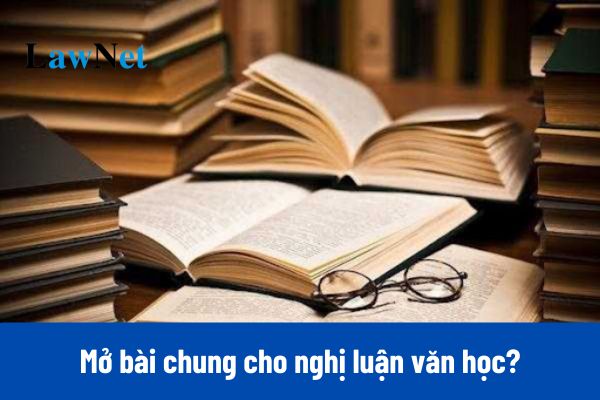What are the 07+ sample common introductions for literary argumentative essays? What is the grade at which students in Vietnam start learning about literary argumentation in the Literature curriculum?
What are the 07+ sample common introductions for literary argumentative essays?
Students can refer to the following sample common introductions for literary argumentative essays:
General Introduction according to the Value of the Work
Literature is a mirror reflecting the reality of life and the human soul. Each literary work not only demonstrates the talent and thought of the author but also conveys profound human values. [Work Title] by [Author Name] is a representative work that reflects [the main content of the work] and leaves many deep impressions on the reader's mind.
Introduction a Famous Opinion or Quotation
The writer [Author Name] once said: “[Quotation or opinion related to the work or argumentative topic].” Indeed, that opinion is entirely appropriate when discussing [Work Title] by him/her. The work clearly expresses [argumentative matter], while also conveying profound values about [the ideological content of the work].
Introduction according to the Context in Which the Work Was Born
Each literary work is not just a simple story but a crystallization of the era, societal context, and author's thoughts. [Work Title] by [Author Name] was born in the context of [historical, social context] and deeply reflects the issues of the time. Through the work, the author conveyed [the main issue of the work], contributing to creating enduring value for literature.
Introduction according to the Author's Style Characteristics
[Author Name] is one of the outstanding writers of Vietnamese/world literature, with a [prominent style trait] style. His/her works always bear notable marks of [characteristic of the style]. Among them, [Work Title] is a typical example, clearly expressing [argumentative matter] and leaving many profound values in the reader's heart.
Introduction by Directly Raising the argumentative matter
Literature not only reflects life but also contributes to changing human perception. One of the important issues that many writers are concerned with is [argumentative matter]. In [Work Title], [Author Name] deeply expresses this issue through [main content], leaving strong impressions on the reader's mind.
Introduction by Connecting with Another Work
In the flow of literature, many works, though born at different times, share common thoughts and values. If [Another Work Title] by [Another Author Name] reflects [a certain issue], then [Work Title] by [Author Name] also deeply explores this aspect. With its unique expression, the work contributes to highlighting [argumentative matter] and leaves a deep impression on readers.
Introduction by Mentioning Real Life Related to the Work
Life is always moving with eternal values of love, compassion, justice, or human fate. These values have been vividly and profoundly depicted in literature. [Work Title] by [Author Name] is a typical example when the work not only reflects [argumentative matter] but also brings meaningful lessons about life.
With these opening models, you can flexibly apply them to different literary argumentation essays!
Note: Information is for reference only!

What are the 07+ sample common introductions for literary argumentative essays? (Image from the Internet)
What is the grade at which students in Vietnam start learning about literary argumentation in the Literature curriculum?
Under Section 5 of the General education program in Literature issued with Circular 32/2018/TT-BGDDT, the literary knowledge in the 6th-grade Literature curriculum is defined as follows:
LITERARY KNOWLEDGE
1.1. The expressive nature of literary texts
1.2. Details and the relationships between details in literary texts
1.3. Topic, theme of the text; feelings, emotions of the writer
2.1. Elements: story plot, characters, narrator's speech, and character's speech in legends, fairy tales, fables
2.2. First-person and third-person narrators
2.3. Formal elements of six-eight-word verse poetry: number of syllables, number of lines, rhyme, rhythm
2.4. Title, line of verse, stanza, rhyme, rhythm, words, and effects of these elements in the poem
2.5. Narrative, descriptive elements in poetry
2.6. Form of recording, narrating events, first-person narrator in memoirs or travelogues
TEXT CORPUS
1.1. Literary Texts
- Legends, fairy tales, fables, short stories
- Poems, six-eight-word verse poetry
- Memoirs or travelogues
1.2. Argumentative Texts
- social argumentation
- Literary Commentary
1.3. Informational Texts
- Texts recounting an event
- Meeting notes
- Diagram summarizing content
2. Suggested text selection: see suggested list
...
Thus, students in Vietnam start learning about literary argumentation in the 6th-grade Literature curriculum.
What are the perspectives on developing the 6th-grade Literature curriculum in Vietnam?
According to the General Education Program for Literature issued with Circular 32/2018/TT-BGDDT, the perspectives on developing the 6th-grade Literature curriculum are as follows:
- The curriculum is developed on theoretical and practical foundations, updates on research achievements in education, psychology, and teaching methodology of Vietnamese literature; achievements in literature and linguistics research; achievements in Vietnamese literature across various periods; experiences in developing Vietnamese literature curricula, particularly from the early 21st century until now, and international trends in curriculum development in general, and the curriculum in particular over recent years, especially from developed countries; societal practice, education, economic conditions, and Vietnamese cultural tradition, especially the diversity of students in terms of regions, conditions, and learning abilities.
- The curriculum focuses on training communication skills (reading, writing, speaking, and listening) as a central theme throughout all three education levels to meet the program's capacity-oriented direction and ensure coherence and continuity across all grades and levels. Fundamental, foundational knowledge about the Vietnamese language and literature is formed through activities in comprehending and creating texts; directly serving the requirement of training in reading, writing, speaking, and listening skills.
- The curriculum is developed with an open approach, reflected in not specifying detailed teaching content but stipulating the outcomes needed in reading, writing, speaking, and listening for each grade; delineating some basic, core knowledge about the Vietnamese language, literature, and some texts with a significant, crucial position in national literature as mandatory content for students nationwide.
- The curriculum meets both the innovation requirements and emphasizes inheriting and enhancing the strengths of existing Vietnamese literature curricula, especially the current one.

